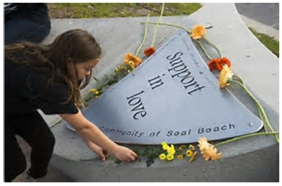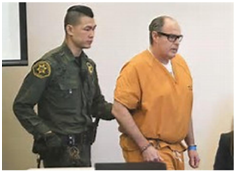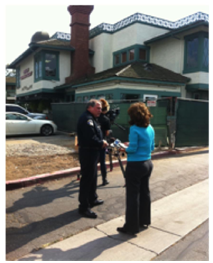
“A Piece of My Mind”
October 2017 Newsletter
Advancing Christian Faith and Values,
Defending Religious Liberty for All,
Supporting Civility and the Common Good
through Preaching, Teaching, Writing, Activism and Reasoned Conversations

October 12, 2011 – Massacre in Seal Beach—the worst mass killing in the history of Orange County, CA

September 22, 2017 – The mass murderer sentenced to life without parole
National Moral Renewal?
Be Careful! Trim Expectations.
“Ambition for national moral renewal strikes a chord in many modern democracies, where it is easy to change politicians but much harder to change the political culture.
The problems are obvious. Hypocrisy is easily mistaken for piety; piety is a poor substitute for competence; and power corrupts.”
– Protestants by Alec Ryrie
The Protestant Reformation at 500
1517 - 2017
Lessons from the Reformation #3
 “Sola Scriptura”
“Sola Scriptura”
“Sola Scriptura” – The Bible alone is the supreme authority in all matters of faith and doctrine.
“Sola Scriptura” was and is a bedrock principle of the Protestant Reformation.*
Luther and Protestants after him reject (officially, that is) any authority parallel to the Bible, whether it be the teaching authority of the church, the voice of a religious leader, the tradition of the church, or something else.
I say “officially” because we’ve never been as good as we think we are in carrying out the implications of “Sola Scriptura” in practice. We Protestants have our creeds and statements of faith. We sometimes displace Scripture and make these statements the final authority. We have our “codes of conduct” by which we judge the spiritual adequacy of others—codes drawn not from Scripture but from our religious subcultures. We have our “little popes,” accountable to no one, who pontificate over their own religious fiefdoms. We have self-anointed prophets who say, “Thus saith the Lord.”
With these errors we operate unchecked by the rich historical theology that should give us lessons of the past. And we violate “Sola Scriptura.”
To the other extreme, “Sola Scriptura” doesn’t mean we use nothing but the Bible! Consider this word about regard for tradition in Lutheran theology:
Sola Scriptura in Lutheran form is not against tradition per se. While some brands of Christianity might insist that if it’s not in the Bible then it’s not Christian, Lutheran theology understands that a tradition is allowable when (a) it is not contradicted by scripture, (b) it serves a purpose that is scriptural, and (c) it is not enforced as a pre-condition for Christian unity. – Hans Wiersma, “A Brief Introduction to sola scriptura.”
Cultural and historical studies, the community of the saints, and yes, the tradition of the church are to be considered.
“Sola Scriptura” also points to how we interpret the Bible. We let the Bible interpret itself as best we can. One scripture sheds light on another. Scriptures dwelling on a theme are weighed more heavily than isolated references. The New Testament interprets the Old—the coming of Jesus gives us eyeglasses for understanding the Old Testament.
The “literal” meaning of the scriptural text is to be preferred over hidden, esoteric meanings. And by “literal” I mean the meaning that the author intended when he wrote, as best we can discern it. Not some form of “wooden literalism” we impose on the biblical text. “Literal meaning” is how it would be understood in its own time and setting, not how it strikes us today. “Literal” also looks to the literary genre of a text—the Book of Revelation is not to be read like the Book of Acts, nor poetry as we read narrative.
Finally, “Sola Scriptura” embraces the ministry of the Holy Spirit. The same Spirit who inspired the sacred text now opens it to our hearts. But this does not mean that the average person using common means cannot understand the Bible. The Bible isn’t hidden to average folk and its inner meaning then revealed to super saints. Its “literal” meaning is available to all.
What role, then, does the Spirit play? The Holy Spirit convinces us of the sacred truth of the Text, that the words we read are indeed the Word of God speaking to us. In similar fashion, people can know about Jesus through natural understanding. But they cannot genuinely confess him as Lord except by the illumination of the Holy Spirit (1 Corinthians 12:3).
“Sola Scriptura” opens us up to God’s written communication. In it we find truth and life and hope and direction. In it we encounter Jesus.
Holy words long preserved,
For our walk in this world.
They resound with God’s own heart Oh let the ancient words impart.
Ancient words ever true,
Changing me, and changing you. We have come with open hearts Oh let the ancient words impart.
– Ronnie Freeman, Jr. & Tony Wood
* “Sola Scriptura” is the “formal principle” that shaped the Reformation. “Justification” is the “material principle,” the concept at the heart of the Reformation.
 Religious Liberty Vigilance
Religious Liberty Vigilance
“No provision in our constitution ought to be dearer to man, than that which protects the rights of conscience against the enterprizes of the civil authority.” – Thomas Jefferson
Now before the Governor: "The California Reproductive Health Non-Discrimination Act" (Assembly Bill 569)
AB-569 is a major intrusion into the right of churches and other religious organizations to govern their affairs by the dictates of their faith rather than by the secular aspirations of the state. It has passed both houses of the state legislature and now sits on the desk of Governor Jerry Brown, awaiting his signature or veto.
The governor has until mid-October to make a decision. Citizens can express their opinion to the governor in a number of ways:
Governor Jerry Brown
State Capitol, Suite 1173
Sacramento, CA 95814
Phone: (916) 445-2841
Fax: (916) 558-3160
Email via Contact page of
Governor’s Website:
www.govapps.gov.ca.gov
For my published commentary on AB-569, please access and read: www.presstelegram.com/opinion/20170819/california-lawmakers-are-meddling-in-religion-guest-commentary
 “They all plotted together to come and fight against Jerusalem and stir up trouble against it. But we prayed to our God and posted a guard night and day to meet this threat.” – Nehemiah 4:8-9 (New International Version)
“They all plotted together to come and fight against Jerusalem and stir up trouble against it. But we prayed to our God and posted a guard night and day to meet this threat.” – Nehemiah 4:8-9 (New International Version)
Closing a Chapter on a Mass Murder
 “The gates of hell flew open and you emerged as the face of evil in this community.”
“The gates of hell flew open and you emerged as the face of evil in this community.”
– Judge Thomas Goethals to Scott Dekraai
October 12, 2011 – Early in the afternoon Scott Dekraai entered a hair salon in Seal Beach, California and killed eight people including his ex-wife, with whom he was having a bitter custody dispute.
The case languished for almost six years, hindered by charges of prosecutorial misconduct. Be that as it may, Dekraai pled guilty in 2014 and was sentence on September 22 of this year to eight consecutive life sentences without the possibility of parole for the worst mass murder in Orange County history.
 This chapter of the families’ agony is over. But as I told a NBC reporter in 2012, the word “closure” will never be appropriate. There are milestones, but no closures.
This chapter of the families’ agony is over. But as I told a NBC reporter in 2012, the word “closure” will never be appropriate. There are milestones, but no closures.
The families and the community will never be the same. The police department, dispatchers, fire and police first responders will never be the same. As a police chaplain who has been involved in this matter for over five years, I will never be the same.
But the milestones are real and for them we give thanks. The one-year anniversary observance in Seal Beach, the reopening of the salon, the dedication of a memorial plaque in honor of the victims, the gathering of many family members at the memorial on October 12, 2016 marking five years, and now the end of the trial—all true milestones.
“Justice delayed is justice denied,” said William Gladstone, 19th Century British Politician. Whatever the reasons, valid or regrettable, for the great delays in (flawed) justice, I grieve at the additional stress and sorrow the delays put on the families of the victims and many others.
God, heal us all!
Bible Insight When the Family Pet Dies

We had to have our German shepherd Kyzer put to sleep today (September 27). It has not been a happy day. Encouragement came to Mary and me from the Book of Proverbs (12:10), if I may paraphrase: “Good people are concerned about the well-being of their animals.”
When I was a child and experienced the death of a pet, this tough experience helped prepare me, in ever so small a way, for the much more significant death of a loved one. Neither loss will ever be easy—life itself isn’t easy.
The Bible’s “Book of Ecclesiastes” is one of my favorites. In bold words it faces the realities of what inevitably happens as we live “under the sun,” that is, looking at realities through a naturalist perspective. It is brutal sometimes. But glimpses of hope and help emerge.
I said in my heart with regard to the children of man that God is testing them that they may see that they themselves are but beasts. For what happens to the children of man and what happens to the beasts is the same; as one dies, so dies the other. They all have the same breath, and man has no advantage over the beasts, for all is vanity. All go to one place. All are from the dust, and to dust all return. Who knows whether the spirit of man goes upward and the spirit of the beast goes down into the earth? (Ecclesiastes 3:18-21)
So what does this fascinating work of literature say here? Our natural eyes and mind can’t discern any difference between the death of an animal and the death of a man. Ecclesiastes doesn’t fall for the Platonic dualism that has so influenced the thinking of Christians. Animals and people die (give up the breath of life) alike; they go to the grave alike. No difference.
Despairing? Yes, by itself. But Ecclesiastes continues by encouraging every man and woman to enjoy their work and the fruit of their labors nonetheless.
So I saw that there is nothing better than that a man should rejoice in his work, for that is his lot. Who can bring him to see what will be after him? (3:22)
Far from leading us to hopeless despair, we are encouraged to see life as full of opportunities to embrace and blessings to enjoy—all from the hand of God. Read more…
Behold, what I have seen to be good and fitting is to eat and drink and find enjoyment in all the toil with which one toils under the sun the few days of his life that God has given him, for this is his lot. Everyone also to whom God has given wealth and possessions and power to enjoy them, and to accept his lot and rejoice in his toil—this is the gift of God. (5:18-19)
And now my favorite! Pastors, how about using these verses for a benediction at the end of the church services some Sunday:
Go, eat your bread with joy, and drink your wine with a merry heart, for God has already approved what you do. Let your garments be always white. Let not oil be lacking on your head.
Enjoy life with the wife whom you love, all the days of your vain life that he has given you under the sun, because that is your portion in life and in your toil at which you toil under the sun. Whatever your hand finds to do, do it with your might, for there is no work or thought or knowledge or wisdom in Sheol [the grave], to which you are going. (9:7-10)
Ecclesiastes isn’t the whole biblical story on what the future holds. The New Testament especially sheds light on themes like resurrection, Judgment Day, and future existence with or without the presence and blessing of God.
But even Ecclesiastes, with its generally naturalistic look at things, ends with a bold reminder of how to rightly order our lives:
The end of the matter; all has been heard.
Fear God and keep his commandments,
for this is the whole duty of man.
For God will bring every deed into judgment,
with every secret thing, whether good or evil. (12:13-14)
As my writing here was wrapping up, my son (who along with our daughter has been so encouraging to us throughout our loss) called to say that a good friend of our family had just become the father of a baby girl.
The Lord gave, and the Lord has taken away; blessed be the name of the Lord.” (Job 2:21)

Don’s Upcoming Ministries
October 29 (Reformation Sunday) – Speak on “Reformation Reminder: The Freedom of the Christian” at Grace Community Church of Seal Beach (8:00, 9:30, & 11:00 a.m.)
November 14 & 17 – Teach on “Be Filled with the Holy Spirit” (Ephesians 5:15-21) at Women Bible Study, Grace
Community Church of Seal Beach
My Website: www.donaldshoemakerministries.com
Contact me at: donaldshoemakerministries@verizon.net</>
Addendum: A Statement on Civility
As Public Civility Deteriorates Further, Ponder This and Promote It Again…
Genuine civility moves past simple politeness or pragmatic concerns and sees those with whom we disagree as full equals before God. It does not allow the end to justify the means.
Civility enables us to hold the respectful dialogues without which democratic decision-making is impossible. Civil people approach their government institutions with awe and gratitude.
Civility is the negative duty not to do harm and the affirmative duty to do good.
Civility cares for one’s own identity, needs and beliefs without degrading others in the process. It is about disagreeing without disrespect, seeking common ground as a starting point for dialogue about differences, listening past one’s preconceptions, and asking others to do the same.
Civility is the hard work of stopping to listen even with those with whom we have deep-rooted and fierce disagreements.
A Call for Civility
First, we call on our political leaders at all levels, from the White House to Congress to elected and appointed officials at all federal, state and local levels, to commit themselves to the practice of civility in what they say to others and how they treat others. We look with alarm at the deterioration of communication, especially good face-to-face communication, in today’s political climate.
Second, we call on political leaders and citizens to be honest and respectful in their political rhetoric, and to duly honor others in spite of political differences and flaws. We urge communication that truthfully focuses on issues and avoids harmful ad hominem characterizations of people.
Third, we condemn all acts of incivility, including outright violence and destruction, and denying others their constitutional right to free speech and freedom of association and assembly.
© 2017 Donald P. Shoemaker
Read before the Long Beach, California City Council on August 22, 2017 Read before the Seal Beach, California City Council on September 11, 2017
Sources for certain definitions of Civility: Civility by Stephen L. Carter (Harper Perennial, 1998), Institute for Civility in Government (instituteforcivility.org)

